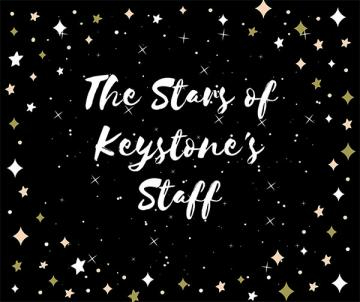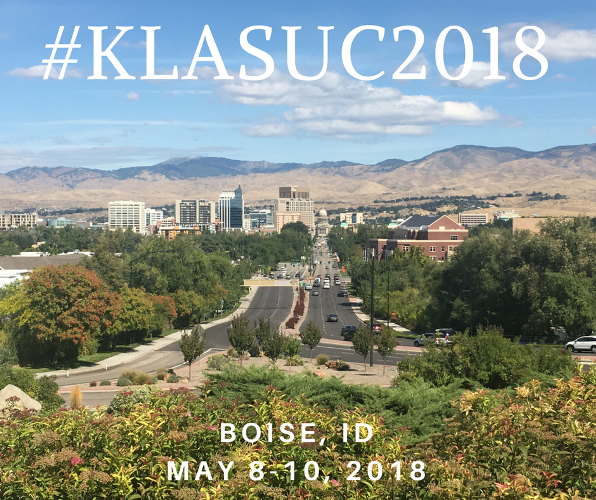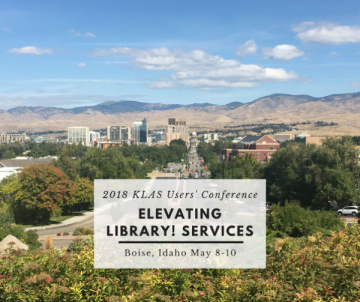- Katy Patrick
- News
Welcome back to the "The Stars of Keystone Systems' Staff" series. Each will include some basic info and insight into one of our staff members. We hope these posts will provide you a look into who makes up our diverse, supportive, and knowledgeable staff.
Basic Stats:
Name of Staff Member: Drea Callicutt
Year Hired: 2002
Current Job Title: Marketing, Sales & Communications Coordinator

Getting to Know You Q&A:
Q: What is your favorite part of your job?
A: Collaborating with other Keystone staff as well as staff from our various libraries and organizations to create and provide opportunities for our users to learn and share how to better serve your patrons.
Q: What did you do before working for Keystone?
A: After graduating with a B.A. in Journalism, I was a teacher’s assistant in a Montessori classroom and then worked for Tech Resource Group providing onsite and then phone-based tech support for contracted clients.
I joined Keystone in December 2002 and combined my Communications degree and experience in software and hardware to fill the position of “Sales & Marketing Support”. In 2011, I decided to go back to school part-time. I graduated in 2014 with a Masters in Library Science with a concentration in Special Libraries and an emphasis on community / public relations, outreach, and serving special populations.
Q: What are your hobbies outside of work?
A: My husband and I have participated in non-profit medieval reenactment organization for over 20 years. In fact, we met at a business meeting of our local group. A few years ago, we also became costumed volunteers at Jamestown Settlement in VA where we interpret and teach the public about life in the colony including historic clothing, foodways, etc. Also, I love to travel, sew, cook, read, and play board and card games.
Q: If you could go anywhere on vacation, where would you go?
A: I am very interested in traveling to the far east, in particular, India and Thailand. I especially love the history, arts, and food of each of these cultures.
Q: Do you have any pets? If so, what kind and what are their names?
A: My husband and I have three dogs. Enoch Squirrlesbane’s a 9 or 10-year-old pug / beagle mix that was found as a stray. Lafayette Nubbintail is a 3-year-old French bulldog chihuahua mix from a local animal shelter. Hercules Maximillian Mulligan aka Max is a 9-year-old pug from NC Pug Rescue.

- Andrea Callicutt
- News
At the 2018 KLAS Users' Conference Craig Hayward, President, KLAS Users' Group, announced a renewal and revamp of the KLAS Development Advisory Committee (KDAC). The KDAC serves an advisory role to Keystone on new features being developed for future releases of KLAS.
The terms of the original persons on the committee have expired, but the Officers' and Keystone Staff feel it is needed particularly now with a web-based version of KLAS on the horizon, duplication on demand, and other new projects and features currently being discussed. Over the last couple of weeks, the Users' Group Officers' in coordination with Keystone have been working to update the library breakdown list, identify and discuss possible committee members, and to prepare for the committee's reconvening. Erin Pawlus, Secretary, KLAS Users' Group and Users' Group Officers' Liasion to KDAC, will soon send invitations to possible new committee members with an anticipated meeting of the new committee members in mid-late August.
More info about KDAC:
Note: You must be logged into klasusers.com to access the below files.
Goals:
- Solicit and review KLAS Development Suggestions
- Report on activities at the biennial KLAS Users’ Conference
- Communicate with constituents.
Guidelines:
Membership:
Six committee members representing the following categories of KLAS Users plus a Users' Group Officers' Liasion:
- Large regional libraries
- Mid-size regional libraries
- Small regional libraries
- Subregional libraries
- Special Organizations / Schools
- Instructional Resource Center (IRC) / Instructional Materials Center (IMC) Users
Breakdown of all KLAS Libraries and Organizations in the above-defined categories:
Original KDAC members:
- Joel Henderson, Oregon, Committee Chair
- Teneka Williams, Georgia
- Martin Landry, Montana
- Sarah Smedley, PBC/Florida
- Jerry Barrier, Perkins
- Cheryl Manuel, Kansas
- Katy Patrick
- News
Good patron profiles are key to good service. However, with so many aspects to consider, it can be easy to make entry mistake, and time-consuming to manually double-check everything. Fortunately, there are ways to find potential issues without having to comb through records by hand.
Here are some quick and easy ways to find and fix issues in patron profiles — before you get an angry call or lose a patron.
Quality Control Checks
For more detail and screenshots, check out the attached "FixIt" document.
Exclusion Subjects as Preferences
Any subject can be entered as a preference or made into an exclusion. However, some headings, such as Strong Language or Male Narrator are only intended for use as exclusions. Even if a patron does not object to that content, they almost certainly do not intend to receive books chosen solely by that criteria.
To catch exclusions that were accidentally entered as preferences, query for a list of common exclusions (such as strong language or violence) that do not have the "Exclusion" checkbox marked.
- Preference : Type : Equals : SUBJECT
- Preference : Exclusion : Equals : NO
- Preference : Code : In : (list of subject codes; for example st,se,vi)
On-Demand Service with Requests
Patrons with a service type beginning with O (such as OL – On Demand) will not be served by Nightly Processing for that medium. This means that KLAS will never check to see if it can send books in that medium from their request lists. However, requests can still be added through the OPAC or by staff.
To make sure the patron gets the books they've asked for, you can query for patrons who are set to On-Demand service, but who have Requests. You can then switch the patron to scheduled service (such as nightly, weekly, calendar, etc.) or change the requests to Reserves.
- Media : Pat Medium : Equals : DB (or as needed)
- Media : Serve Code : Begins : O (the letter)
- Media : # Requests : Does Not Equal : 0 (the number)
AutoSelect Patrons without Preferences
This last one is the easiest. Many libraries rely heavily on autoselect to get books out to their patrons, but if no preferences have been added, KLAS will not be able to send anything to them. Run the "AutoSelect w/ No Subjects" pre-defined query from the Queries menu to find these patrons, so that their profiles can be completed and subjects can be added.
More Query help: Need help saving queries? Watch the forums this Thursday for a QuickTip!
And, for more information about how the operator terms work, download the Query and Search Operators cheat sheet.
- Katy Patrick
- News
I hope you had a great Labor Day weekend!
As I’m settling back into my routine, I’d like to update you on the newly-reformed KDAC. The KLAS Development Advisory Committee had their first meeting last week. After a round of introductions, I reported to the committee about what the KLAS developers have been up to, and what they’re planning to do next.
It was a long list—with the push towards large-scale duplication and the need to address certain behind-the-scenes structural issues, we have a lot going on. Naturally, the committee members were curious how, with such a full development schedule already in place, they fit into the process. It’s a good question.
We can always think of plenty of things to work on and improve, come up with new features, and generally decide how we think KLAS should look and work. However, what we think is important to implement might not be what you, the users, really want to see. Some things we know need to get done, such as Gutenberg support and the update to KLAS’ character handling (which will accommodate the diacritics that keep coming up in the NLS MARC records, and should be available soon), but others are less sure. There are only so many hours in a day, so what stays on the developers’ to-do list and what gets tabled? If one library calls Support to request a feature, do we push to implement it, or help them find a work-around?
A big part of how we see KDAC functioning is to help us make some of those calls. By bringing together representatives from different types of libraries, we have a ready-and-willing sounding board to help us know which features will benefit a lot of users, and which wouldn’t see as much use. We also hope that they will be able to serve as a contact point for the rest of the Users Group, reaching out to people and getting a feel for what people are excited about, concerned about, and what people haven’t even heard of.
We're also looking ahead to the future of KLAS, past the next upgrade and all the various things we're working on right now to the new, Browser-based KLAS. Those of you who were able to join us for the last conference will remember that we did some usability testing on a prototype patron module. That got us a ton of useful information--but we can't wait for the Users' Conference every time we need feedback. The start of a re-design of this magnitude involves a lot of very important decisions, so we're very grateful for those users who are volunteering their time and experience to KDAC.
So continue to contact KLAS Customer Support or post in the forums when you have questions and suggestions, but feel free to contact the members of KDAC as well! With their help, you can be sure that your voice is heard, and we'll be able to not just make KLAS better but to make it better at doing what you need.
Current KDAC Members
Erin Pawlus - KLASusers' Officer Liason
John Phillos - Delaware Library Access Services (small Talking Book Library)
Dianne Keadle - South Carolina Talking Book Services (mid-sized Talking Book Library)
Amy Ravenholt - Washington Talking Book & Braille Library (large Talking Book Library)
Ricardo Cisneros - San Franciso Public Library - Talking Books and Braille Center (subregional Talking Book Library)
Cyndi Hammond - California Clearinghouse for Specialized Media & Technology (IRC / IMC)
Donald Salvato - Xavier Society for the Blind (schools and special organizations)
Next meeting will be September 25, 2018 at 2:30pm Eastern Time.
- Andrea Callicutt
- News
Here at 8016 Glenwood Ave #200, there's change in the air. A couple of weeks ago we started a large building remodeling and update.
By the time it's complete, the roof will be replaced, we'll have new ceilings, carpet, and paint, and our break room will get an overhaul.
In preparation for the first phase of the work, we packed up one half of our staff and moved them to the other side of the building while work happens on the side they usually occupy. Our programmers, Sales and Marketing Department, Lead Developer, and Technical Writer are in temporary quarters during this phase. Once work is completed on their work spaces, the opposite will occur. Our Customer Support Team, Office Manager, and Systems Administrator will move to temporary digs while their side of the building is revamped.
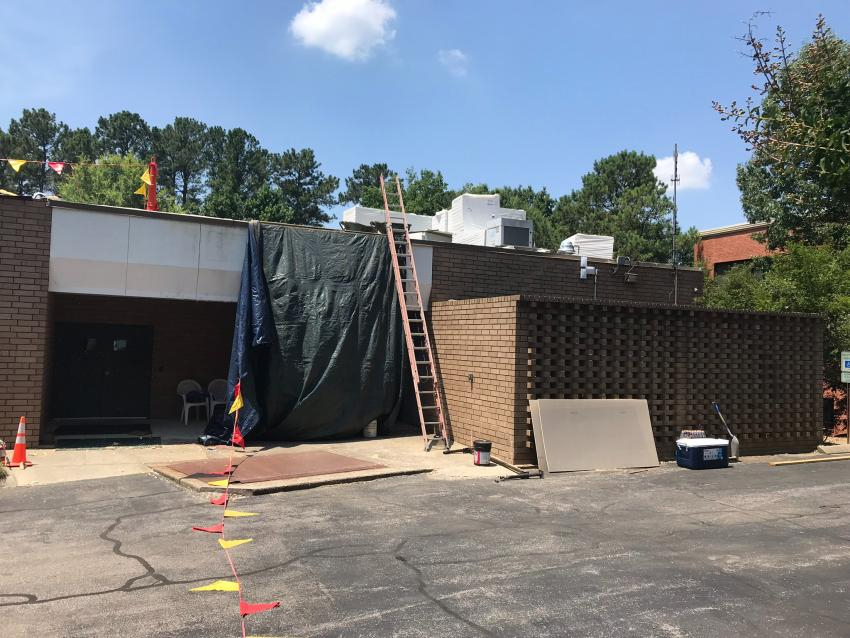
We are going to post photos as the work progresses in an album on Keystone's Facebook Page so be sure to like the page and follow along with the process, but here are a few teasers...
In our small training room, all the ceiling tiles have been removed, so electrical work can be done and they can be replaced.
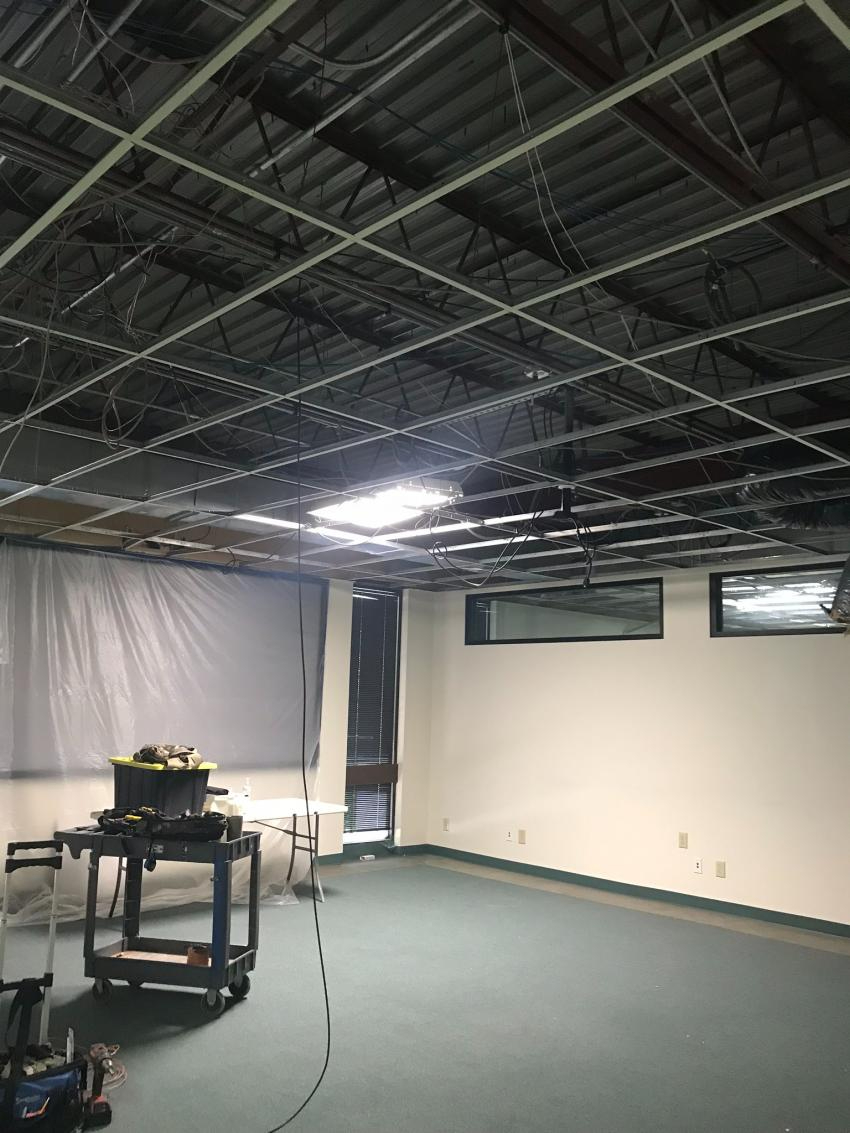
Furniture from Drea, Kyle, Mitake, James, and Lee's offices is currently being stored in what is usually our conference room. They have each taken up temporary residence in other parts of the office.
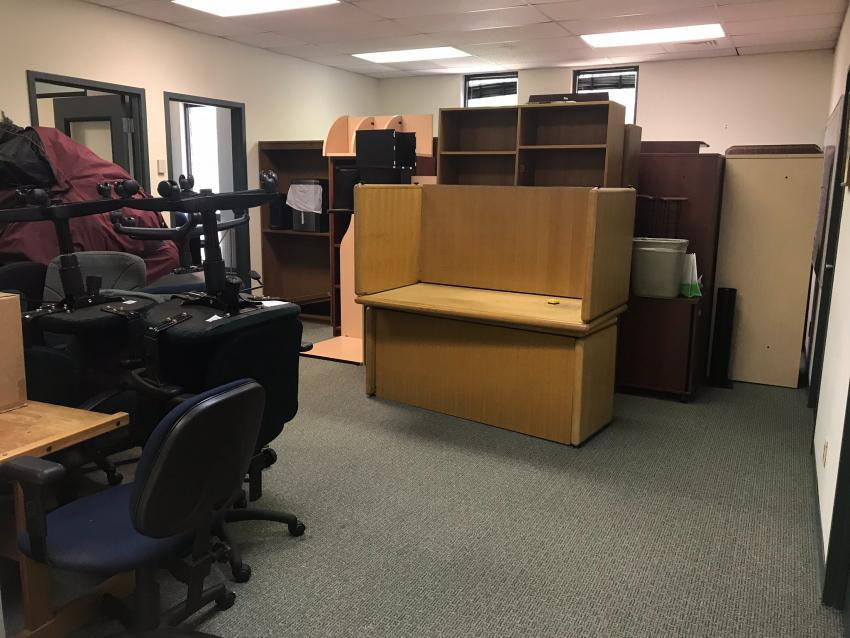
Kyle and Lee working in their temporary setup in the large training room.
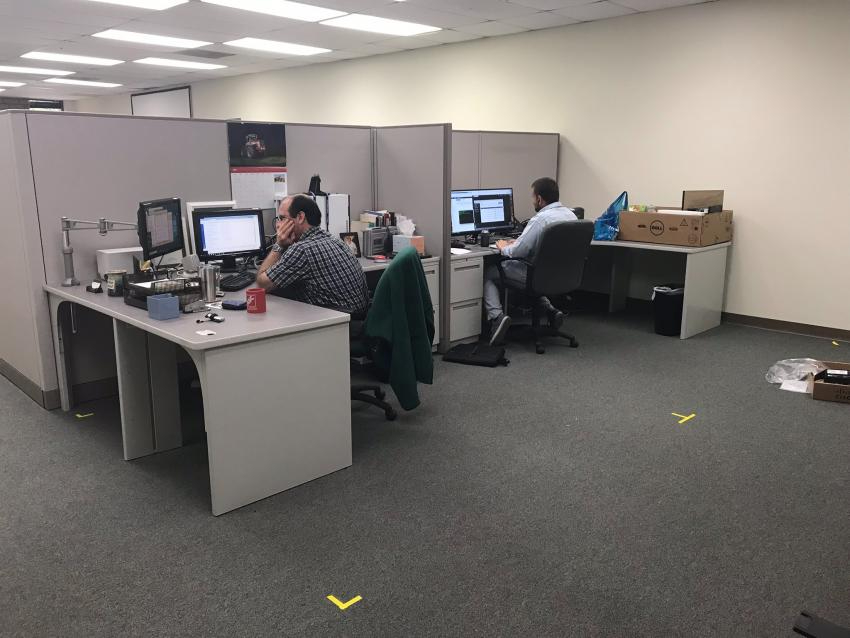
You can see these photos and more in the 2018 Keystone Office Remodeling Album on our Facebook Page. Check there for updates as the work progresses!
- Katy Patrick
- News
Hello, IRCs! We know you are very busy right now so I won’t keep you long. As you’re scrambling to get everything checked in and staged for next year, here are three things to check on before they start causing you headaches:
Default Period
If you have not yet set the default period to the new school year, here’s a forum post that will help you make the switch: Period Maintenance – New School Year.
Loan Period
For some IRCs, materials are automatically given a due date at the end of the current period. Others, however, set a specific due date, which will need to be manually updated each year. Make sure your system is using the due date you want for new materials.
WebOrder Request Types
Check that the request types listed for creating a new Material Request are up-to-date. Many IRCs will list a “Current School Year” and “NEXT School Year,” so make sure your labeling matches the correct year. Request types for the year that is now over should be removed. Let us know what changes need to be made.
Once you have these set, you’ll be ready to start the new school year right.
And as always, give us a call or email if you have questions or need help!
- Andrea Callicutt
- News
Today we're starting the first in a series of Key Notes blog posts called "The Stars of Keystone Systems' Staff". Each will include some basic info and insight into one of our staff members. We hope these posts will provide you a look into who makes up our diverse, supportive, and knowledgeable staff.
Basic Stats:
Name of Staff Member: Katy Patrick
Year Hired: 2017
Current Job Title: Technical Writer

Getting to Know You Q&A:
Q: What is your favorite part of your job?
A: I love the variety: I get to work on a wide variety of things from how-to documents and blog posts to pitching in to help test new releases. I always have a lot of different projects in the works, so I never get bored.
Q: What did you do before working for Keystone?
A: I worked as a Reader Adviser for Kansas' and then Illinois' Talking Books programs. That work meant a lot to me, so I'm glad that I have been able to stay connected to that community despite moving on to a new type of work.
Q: What are your hobbies outside of work?
A: Fiction writing, mostly fantasy novels. I haven't gotten anything polished and ready for publishing yet, but maybe someday! I also enjoy sewing, digital art, photography, and gardening.
Q: If you could go anywhere on vacation, where would you go?
A: I'd love to go to Machu Picchu. It looks like such an amazing window into another time and culture and set in an incredibly beautiful landscape.
Q: Do you have any pets? If so, what kind and what are their names?
A: I have a pair of finches: Terragon (a Spice Finch) and Wrenegade (a Society Finch). They love birdbaths and listening to the radio, and their favorite treat is carrots.
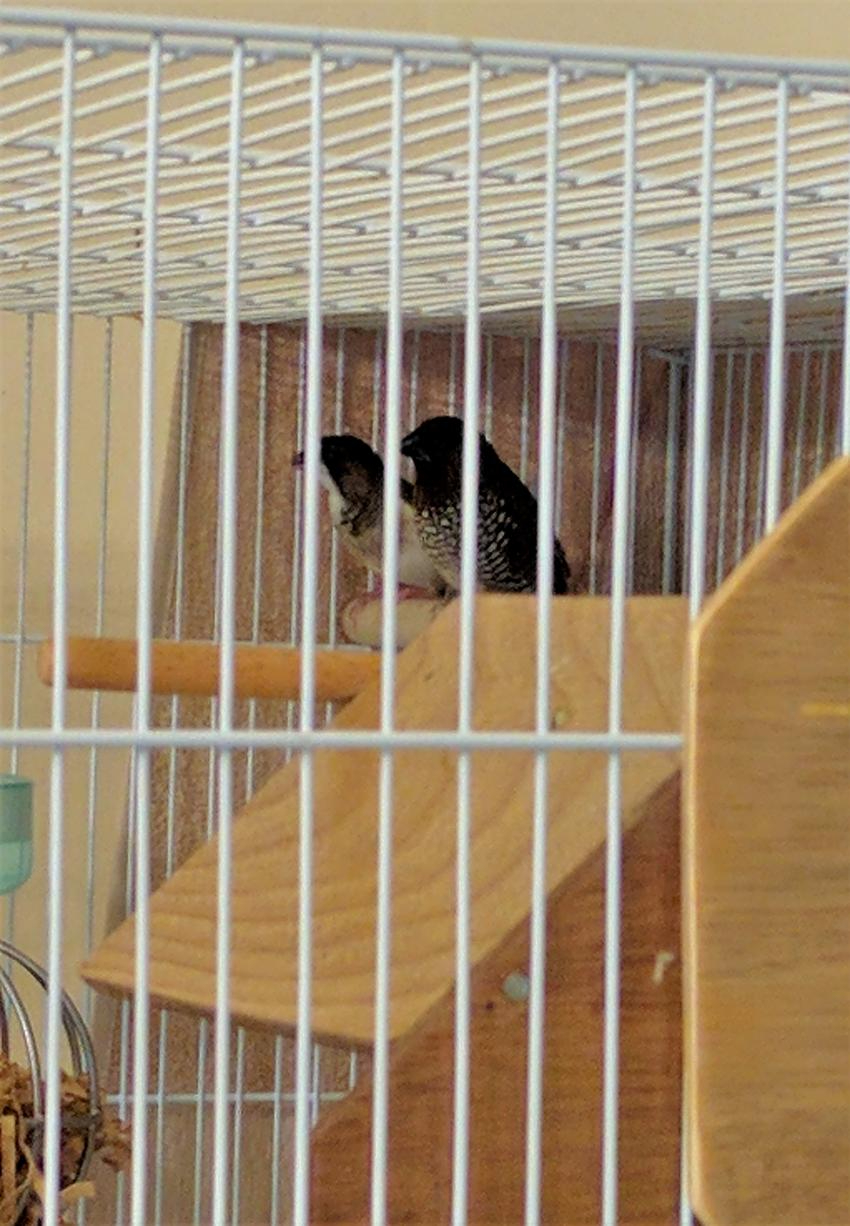

- Katy Patrick
- News
Ah, Summer. Time for swimming, barbeque... and Summer Reading Programs!
As Summer Reading Program season ramps into full gear, are you wishing you had a better way to target mailings or generate grade-appropriate reading lists?
Do you need an efficient way to promote your new book club or an author event?
You may have more options than you realize!
Queries are your best tool for generating a list of patrons matching certain criteria. For example, you can search for patrons based on their area, subject preference, or age range. Once you've successfully queried for a patron list, you can use it to print mailing labels or export it for a list of the patrons’ email or mailing addresses. And don't forget, you can query in the Catalogue module as well to generate book lists!
Here are a few examples to help you get started. Then, check out the forum post for more information or to share your own!
Example 1:
You can create a mailing list for individual patrons who have registered for service since your last book club, so they will be hearing about it for the first time.
On the Quick Search tab, query for...
- Patron Type : Begins : P
- Main Status : Begins : A
- Registration Date : Is Between : 06/01/2017 : 06/12/2018 (or today's date)
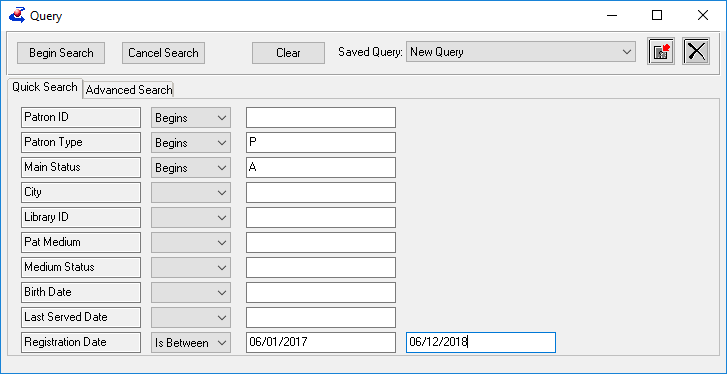
Example 2:
If you use a Preference Code to track your Reading Program or Book Club participation, you can query for a list of participants who have email addresses.
On the Advanced Search tab, query for...
- Preference : Type : Equals : BookClubCode
- Preference : Value : Matches : (the program name)
- Address : EMailAddr : Is Between : 0 : ZZZZZZZZZZZZZZZ
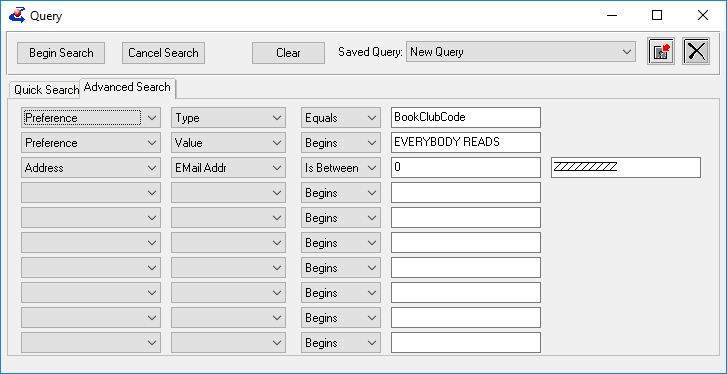
Example 3:
To promote a subject-oriented Book Club or an author event, you can find a list of patrons who live in the area and have a preference for that subject or author.
On the Quick Search tab...
- Patron Type : Begins : P
- Main Status : Begins : A
AND on the Advanced Search tab, query for...
- Preference : Type : Equals : Subject (or Author)
- Preference : Code : Equals : (the subject or author code, such as MYS for mysteries)
- Address : County Code : Equals : (use the LookUp button on the Contact tab to find the County UserCode)
Example 4:
You may want to create a reading list based on appropriate Grade Level, as well as making sure you have several copies of the book on hand.
In the Catalog Module query, on the Advanced Search tab, query for...
- BibRec : Grade : Equals : 3
- BibRec : Title Status : Equals : A
- Statistics : Copies Available : Not In : 0,1,2
I hope this gives you some ideas! As always, let us know if you have questions or need help, and don't forget to check out the forum post for more information or to share your own!
- Andrea Callicutt
- News
Easy access to all features and functions within KLAS has been integral to all phases of the design process since the first version of KLAS, and continues through our ongoing work developing the next generation of the program.
From our first library customer, North Carolina Library for the Blind and Physically Handicapped, Keystone has had a commitment to develop library software and provide support services for all of our users. Now that KLAS is installed and being used by nearly 2/3 of the network libraries that are part of the Library of Congress' National Library Service for the Blind and Physically Handicapped as well as a number of Instructional Resource / Materials Centers, we have a multitude of staff (as well as public catalog users) performing a multitude of tasks and requiring varying levels and types of accessibility. To help support the needs of our users, Keystone offers some different support and services. Examples include:
- Keyboard shortcut access to KLAS
- Testing and troubleshooting of assistive technology software in conjunction with KLAS
- Customized accessibility training for the workflow and AT used by a specific staff member
- Keeping accessibility in the forefront of design as we move toward the next generation of KLAS
Keyboard Shortcuts
KLAS is fully navigable both by a mouse and by a keyboard. In fact, we have seen that it's faster to use a keyboard than a mouse when performing tasks such as entering a new patron or entering multiple subject codes to an item.
To help users learn KLAS-specific keyboard commands and shortcuts, we created a KLAS Keyboard Shortcuts Quick Reference Document which Katy recently updated. You can download it in either Word or .pdf format from the "KLAS Keyboard Shortcuts" article.
AT Testing and Troubleshooting
We do ongoing testing of various types of assistive technologies (AT) and their interaction with KLAS. For example, John C is currently trying to track down an issue with the new JAWS / Zoomtext Fusion software and KLAS. If you are using AT with KLAS and find you are having trouble, please contact both your IT as well as our customer support staff. We may have seen the problem before with another user and already have a solution, or we may be able to help you figure out what's going on at least from the KLAS side.
Accessibility Training
Another service we offer is assistive technology user training and workstation configuration. This service is for any staff member(s) that use assistive technology such as Jaws, ZoomText, WindowEyes, etc. It is a 5-day intensive one-on-one training session done at your staff person's workstation based on their job responsibilities and the adaptive technologies or software they use with KLAS. Please note, your staff member should already be familiar with and using the latest version of their preferred AT software, this training is specifically to configure it and KLAS to your users' specific workflow and needs. Please review the Keystone Training Pricing document for more information.
Designed for All from the Beginning
Accessibility is a core part of our design process. As we look toward creating the new web-based KLAS, our commitment to accessibility from the beginning continues. The consideration of how to make all of KLAS' screens easily navigable and all its features intuitively presented will benefit those both those who use AT as well as those who do not. We already began these discussions with the user interface testing of the new version of KLAS that took place at our 2018 Users' Conference. We will continue to provide feedback opportunities and focused user testing as we move forward.
- Katy Patrick
- News
How are you training your new staff to use KLAS—and how can we help?
We will continue to post Key Note blog posts and weekly tips, tricks, and questions on the discussion forum, and we hope these posts will be both a resource for you and a jumping-off point for you to share and collaborate on resources and methods with each other. But there’s more coming!
I have a lot of ideas about different materials and resources that I could create, but I want to make sure that I’m putting my time into the projects that will benefit you. A few of the possibilities are listed below, but I’m very interested to hear your ides as well! Have a look through the list, then please chime in on the forums.
How do you train your staff? What materials do you already use or what materials would you like to have? What are your needs or wants in terms of evaluation, continuing education, certification?
Idea 1: Video Series relaunch
KLAS staff have created instructional videos before, but there are a lot of challenges for this kind of project. It takes a lot of time and work to create even a short instructional video, and they aren’t easily customizable for different libraries the way a text How-to document is. Every library and other institution that uses KLAS is unique, and has unique settings, workflows, and standards—this is a strength of the software, but it makes it hard to provide generalized instruction.
Because of these challenges, a renewed effort to provide an instructional video series would probably keep a high-level view (i.e. “What is in this module” and “How to use the screen” but not step-by-step instructions for specific tasks or processes such as “How to check out a book”) meant to introduce staff to the different parts of KLAS and how to use basic controls standard throughout the system.
Idea 2: Assemble-your-own KLAS Scavenger Hunts
The KLAS Scavenger Hunt is a skill evaluation method we have used in the past. As context, the 2014 Scavenger Hunt and answers are available for download at the end of this post.
Because these are text documents, I could create various sections addressing different common set-ups and procedures. Then, from the “Master Test,” individual libraries could pick and choose the questions that apply to their situation. This would help to share the work of customization and would hopefully be flexible enough to meet many needs and remain sustainable through upgrades.
Idea 3: Online Evaluations
These would face many of the same challenges as the Video Series. Depending on what platform I find to help me create them, some customization would hopefully be possible, but a significant re-do for each interested library and IRC would be unlikely except as part of the subscription below.
These would essentially be an augmented, self-contained version of the Scavenger Hunt, though they would need to remain at least a little more general. They would facilitate evaluation of staff skills, and potentially even a certification if such a thing is of use, without needing a supervisor to grade the test themselves.
Idea 4: Training Subscription
Finally, this is an idea that Drea has been mulling over. A training subscription would be a paid, annual service which would allow us to provide customized training targeted directly to your needs. The subscription could potentially include a series of webinars (either quarterly or scheduled as needed), which would be recorded and available to your staff from then on, as well as one or more custom Online Evaluations.
Our current price list for our current training services is attached below; several of you have been taking advantage of these options, and they are still available. However, we recognize that training is often an ongoing need, rather than a one-time event. Our thinking is that an annual subscription could help you build training into your annual budget, while also helping us to plan out what we will need to provide through the year.
Wrap-up
Remembering that these are ideas for brainstorming and not formal offerings: which would you most like to see? Do you have your own ideas? Would you be interested in a paid training subscription, and if so, what would you like to be included?
We also want to hear what you are doing for training now—and we know your peers will be interested as well! So whatever your situation, drop on by the forum and join the conversation.
Please Note: The scavenger hunt questions and answers are included for context purposes, and are not considered "ready to use" at this time.
- Andrea Callicutt
- News
ASCLA / KLAS / NOD Award
Did you know that Keystone Systems has sponsored the ASCLA / KLAS / NOD Award annually since 2004?
Actually, your first question is probably, "What is the ASCLA / KLAS / NOD Award?"
In 2000 the Association for Specialized and Cooperative Library Agencies (ASCLA) and the National Organization on Disability (NOD) began providing a $1000 award and certificate of recognition for a library organization that developed or expanded its services for patrons with disabilities, specifically through a specific project or change in physical and / or attitudinal barriers to an effort to make their library services more accessible and inclusive. Originally sponsored by Aetna Healthcare, Keystone Systems assumed sponsorship in 2004.
Each year a Keystone representative attends the ASCLA Awards reception at the ALA Annual Conference in support of the recipient and to help present the award. This year the Gwinnett County Public Library in Georgia will be honored for its Removing Barriers Project.
From the American Library Association's press release:
The Removing Barriers Project mission is to strategically identify and address issues that might cause a person to hesitate using their public library. Library staff were charged with identifying who was not currently coming through their doors and then reaching out to area organizations to understand their barriers and actively work to remove them. Project results include a thoroughly updated Accessibility Center, sensory storytimes in each branch, an early opening day and time for families with children on the autism spectrum, and dedicated programs offering a social and educational experience for community members who are developmentally disabled.
The Library’s Strategic Plan for 2015 through 2018 calls for engagement of all segments of Gwinnett’s population and set the organization on a course to actively remove barriers and expand partnerships with community-minded groups and organizations. A major activity to address this goal was the complete renovation of assistive technologies housed in the Lawrenceville Branch. Adjustable height tables, JAWS software, a Prodigi reader that allows a customer to select reading with magnification or listening, an Intel Reader that converts text to digital text, then reads it aloud, high contrast keyboards, and a braille reader highlight the equipment added to the Assistive Technology Center.
The Gwinnett County Public Library’s Removing Barriers Project will be honored at the ASCLA Achievement Awards Ceremony on Saturday, June 23, 2018 from 8:30-10:00am at the ALA Annual Conference in New Orleans.
Congratulations to the Gwinnett County Public Library! You can see a list of all award recipients on the ASCLA Achievement Awards Page.
Francis Joseph Campbell Award
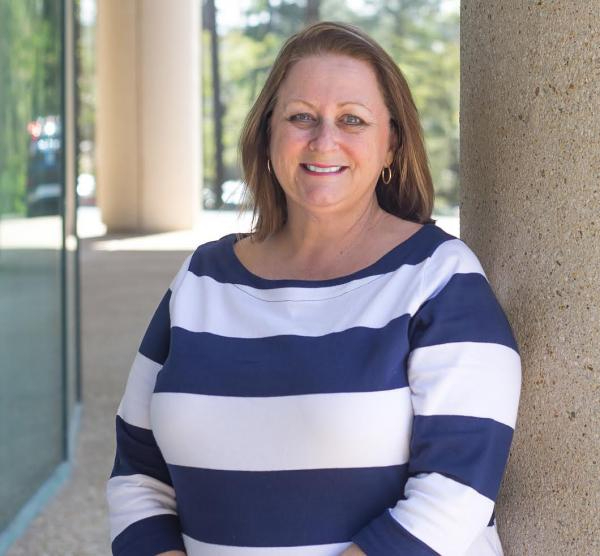 While Keystone does not sponsor this award, we do feel we have a special connection to it. Our annual Julie Klauber Award is named after the 2002 honoree who was the Librarian at Talking Books Plus Outreach Services a part of the Suffolk Cooperative Library System in New York. The Francis Joseph Campbell Award is given annually to "a person or institution that has made an outstanding contribution to the advancement of library service for people with physical disabilities and/or physical impairments".
While Keystone does not sponsor this award, we do feel we have a special connection to it. Our annual Julie Klauber Award is named after the 2002 honoree who was the Librarian at Talking Books Plus Outreach Services a part of the Suffolk Cooperative Library System in New York. The Francis Joseph Campbell Award is given annually to "a person or institution that has made an outstanding contribution to the advancement of library service for people with physical disabilities and/or physical impairments".
The 2018 recipient is Pat Herndon, Director of Georgia Library for Statewide Accessible Services (GLASS), who was selected for her leadership in library service for patrons who need accessible books and media. We are proud to say that GLASS is a KLAS library and was the local host of the 2017 KLAS Users' Conference.
From ALA's 2018 Francis Joseph Campbell Award press release:
“Patricia has led a reorganization of the GLASS’s statewide service and implemented a new strategic plan, but it is her leadership and vision in developing an innovative training event for library staff that has done the most to advance library service for the blind and physically handicapped in Georgia”, said nominator Julie Walker.
“While awards are often given for innovative and/or new projects that garner accolades and attention (and Pat has several of those to her credit), the dedicated professionals at the Center for the Visually Impaired (CVI) who serve and train individuals who are blind or visually impaired want to recognize Pat for her leadership, strategic vision, and hard work to make library services available to all who need them regardless of geographic location in the state”, said Fontaine M. Huey, President, Center for the Visually Impaired.
Pat will also be honored at the 2018 KLAS Achievement Awards Ceremony at ALA Annual on June 23.
Other past Francis Joseph Campbell Award recipients who were staff at KLAS libraries include:
- 2013 Jill Lewis, former director, Maryland State Library for the Blind and People with Physical Disabilities
- 2012 Carole Rose, Indiana Talking Book and Braille Library (retired)
- 2010 Daniel W. Boyd, former director of the South Dakota Braille and Talking Book Library
- 2002 Julie Klauber, librarian, Talking Books Plus, Outreach Services, Suffolk Cooperative Library System, Bellport, NY
- 2001 Barbara Mates, head of the Library for the Blind and People with Physical Disabilities at the Cleveland Public Library
- Andrea Callicutt
- News
Below are the presentations and handouts our presenters and moderators have sent us to date from the 2018 KLAS Users' Conference. Please feel free to download, print, and / or electronically access these presentations and handouts at your convenience.
- Katy Patrick
- News
Whew! Are you all caught up from the Users’ Conference yet?
For those of you who were at the conference, make sure to fill out our feedback form! Every year, the conference planning committees comb through your responses to find out what worked, what didn’t, and what people want from the Users’ Conference. Every voice matters—so please share yours!
For our part, we’re very happy with how the conference went. We came back with a ton of great feedback about what we’ve been working on, and what you want to see from us in the future. I hope y'all were able to learn as much as we did!
We want to keep that energy up and the conversation going, so if you are new to the KLASusers’ website, or if there are others at your library that aren’t on board yet—go right ahead and Create an Account. This is also a great time to let us know if there's anyone at your library that needs to be added to the email list. You don't need to be an admin to participate! Reader Advisors, circulation staff, machine wranglers, records managers, and everyone else who uses KLAS is invited to join in.
If you didn’t get to join us in Boise, want to look over sessions you didn’t make it to, or have a look back at something you maybe, sorta, kinda, remember, Drea has put together an article linking to all of the presentations and handouts: Check it out!
It was wonderful to see so many of you; and we hope you will all be able to attend next year's conference! Read on for a few of my favorite highlights:
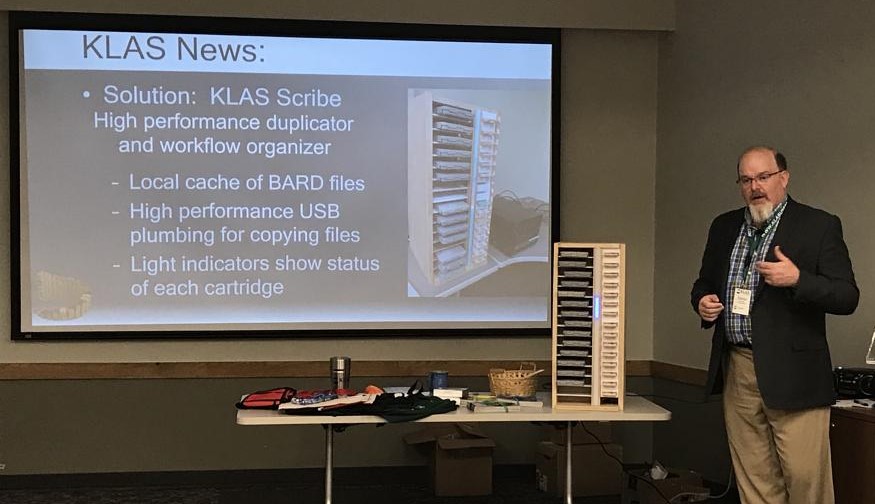
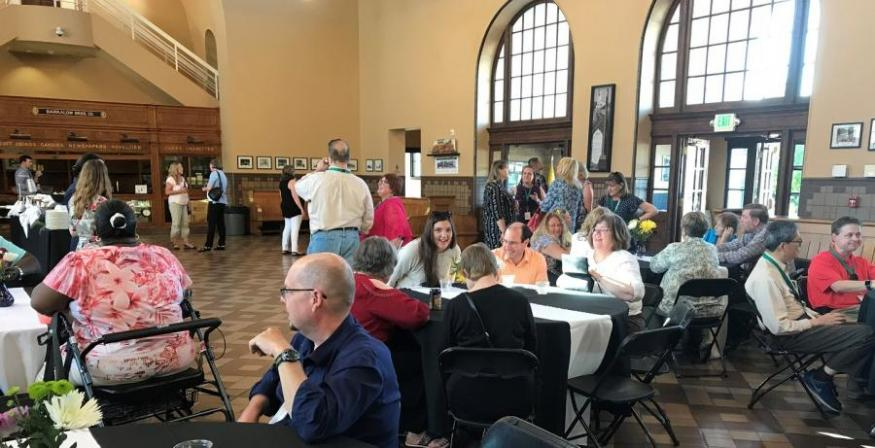
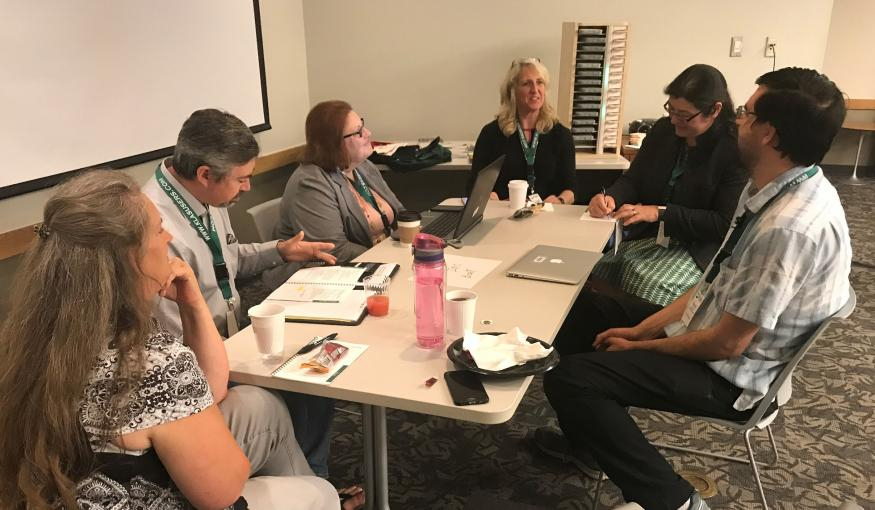

- Andrea Callicutt
- News
The 2018 KLAS Users' Conference finalized Agenda and Daily Schedule documents are now available for your planning convenience in MS Word and .pdf formats. Register online now for the 2018 KLAS Users' Conference and join us in Boise, ID May 8-10.
Also, don't forget to register for your choice of breakout sessions including birds-of-a-feather, seminar, workshop, and hands-on opportunities.
Note: You must be logged into klasusers.com to access these documents.
Finalized Conference Agenda Published: 4/30/18
- 2018 KLAS Users' Conference Agenda - MS Word
- 2018 KLAS Users' Conference Agenda - PDF
Finalized Conference Daily Schedule Published: 4/24/18
- Katy Patrick
- News
You probably know that you can move and sort columns in basically any browse table in KLAS; however, did you know that it is also possible to add or remove columns as well?
When you export a browse table, you have the option of exporting either Visible or All Fields. As that suggests, each browse table includes many columns that are usually hidden. KLAS Customer Support can adjust your library’s configuration, hiding or revealing these columns. While simply moving columns is sufficient for most situations, it affects only the specific user that made the change. A customized browse, on the other hand, affects all users at that branch.
If there are columns that are never needed by your library, you could save the time and confusion of having every reader advisor move them to the far end of the table. For example, columns for the “local branch,” “main branch,” and “all branches” are useful for multi-branch systems, but single-branch systems only need one of the three.
Even better than removing columns is the option to add columns. If there is a column in the “export all fields” results which you would like to be included in the table (for all users at your branch), Customer Support can make it visible. A few columns that libraries have requested are:
Email Address in Patron Find
If you send your newsletter by email or want to alert all patrons in a certain city to an event, you can make exporting the email list faster and easier by including patrons’ Email contact in the Patron Find.
Title Status in Book Search
If your Reader Advisors want quicker access to whether a book is Active, In-Process, or BARD Only, the Title Status column can be added to the Book Search Results.
Have you noticed any columns in the “export all fields” results that your library would like to see in the visible fields? Have any visible columns been confusing your staff, and ought to be tucked away? Contact Ks7 to request a customized browse table—make sure to specify which browse you are working with, the column you need, and where you would like its default location to be. A screen cap is always helpful!
And if a customized browse table is too much commitment (or hasn’t been approved by your supervisor), brush up on how to move and sort columns to make the best of what’s already there.
- Andrea Callicutt
- News
Did you know we've been posting new Key Notes blog posts for 10 weeks straight? In celebration of this and in anticipation of the upcoming 2018 KLAS Users' Conference, Katy and I decided to share our Top Ten list of what we're looking forward to at the conference.
10. The once a year opportunity to see many of our customers / friends in person.
9. Hearing Gary Eller's program and music at the Tuesday evening Welcome Reception.
8. Getting together with our Instructional Resource Customers in IRC focused sessions to discuss their specialized workflows and features designed specifically for them.
7. Hearing the creative ways you use KLAS to help you provide the books, magazines, and equipment your patrons want / need.
6. Touring the Idaho Commission for Libraries, Talking Books Service on Wednesday evening.
5. Getting ideas and suggestions from users for better KLASusers content.
4. Listening to our Keynote Speaker, Ramona Walhof.
3. The chance to do in-person training, helping you use KLAS better!
2. Honoring Nancy Reese, this year's Julie Klauber Award Recipient, during our Opening General Session on Tuesday morning.
1. Unveiling all of the exciting things we've been working on for the future of KLAS -- from PCC to the Browser-based UI, and a few surprises too!
- Andrea Callicutt
- News
The Julie Klauber Award Committee and Keystone Systems are excited to announce Nancy Reese, Idaho Commission for Libraries, Talking Books Service, as our 2018 Julie Klauber Award Honoree. Congratulations Nancy! Your dedicated service to your patrons, staff, and community are an example of leadership and make you an incredible asset to your library. We look forward to honoring you and your work at the 2018 KLAS Users' Conference in Boise! On Tuesday, May 8, Nancy will be presented with the award during the Opening General Session of the conference. An official press release will be published prior to the conference on www.klas.com.
Sue Walker, Library Consultant, Idaho Commission for Libraries, Talking Books Service, nominated Nancy. This is the nomination Sue submitted:
Reason for Nomination
Nancy has been the KLAS administrator for almost ten years. During that time she has helped to implement several new KLAS services such as DOD and the PIMMS transition. Most recently, she was instrumental in implementing the most recent iteration of Patron Centric Cartridge (PCC) that allows staff to assign multiple titles to users' cartridges remotely. Nancy worked intensively with Keystone staff to troubleshoot the software and with staff to train them to successfully use it. As a result, Idaho is one of the few libraries who are using this version of PCC. During the summer of 2017, three of Idaho's four Reader's Advisors retired. Nancy provided training to the new staff as well as ongoing support to maintain quality customer service during the transition period. She routinely provides reader's advisory as a backup to staff. Nancy has been an active member of the KLAS conference planning committee and readily shares her knowledge at annual conferences and individually as requested. Recognizing the importance of having the conference available regionally Nancy advocated to host the conference in Boise for several years and is working on the logistics committee to make the 2018 conference a success.
Effect on Library
Quality customer service is one of the Idaho Talking Book Service’s highest priorities. As a result, remaining on the cutting edge of technology that will improve user access to resources is very important. Nancy’s willingness to learn the capabilities of new technology and work to successfully implement it ensures Idaho residents’ access to resources will increase. In addition, helping Keystone successfully pilot new technology in one library makes it easier to implement in other libraries.
Job Responsibilities
As the KLAS administrator, Nancy works daily with KLAS to troubleshoot any issues, train staff, maintain quality customer service, and access to resources.
- Katy Patrick
- News
For KLAS-to-KLAS patron transfers, a patron’s reading history (HasHads or HHs) automatically transfer with the rest of the record. Thanks to PIMMS, more and more libraries will be able to automatically transfer records, even if one of the libraries uses WebReads or another system. Eventually, even BARD HHs will be automatically imported into the system right away.
In the meantime, however, at least some out-of-system patron transfers will come with a paper or .pdf list of HHs to enter manually, and BARD HHs are only created when the BARD Circulation Stats are manually uploaded. So: should you spend valuable staff time adding these HHs?
Here’s some information to help you make that choice:
How to do it
For transfer patrons: In the Patron Module, open the patron record in question, then press Alt + H on your keyboard or use the menu to select Functions > Items > Add Has Had.
In the Add Has Had window, you will be able to enter KLAS IDs exactly as you do in Quick Requests.
For BARD downloads: Use the Administration page in BARD to download the statistics for your branch for each month. You will need to save the .cscv files; do not open them, as this will re-format the information and keep it from loading properly.
In the Patron Module, use the menu to select Tools > Load BARD Circs. Browse to find the saved stats file, and either Load Now or select Load via Batch Manager. Depending on the size of the file, it may take a while to load.
For help addressing BARD load errors, once the batch has loaded, use Export – Load Errors and save the file. Send it to Ks7 and we will help you identify patron errors and load missing catalog records.
What does it affect?
Nightly Autoselect: For most libraries, the Nightly processes are set up not to re-send HasHads based on author or subject. Generally, your patrons should only receive books they have had before if they specifically request them.
Series: If a patron requests a series, KLAS will prompt you to ask whether HHs in that series should be sent again or if they patron wants to pick up right where they’ve left off previously. If the HHs are on file, it puts this choice right in the patron’s hands (or in the hands of the contact person or RA helping them). If they were never added, the patron will receive “repeat” books whether they wanted them or not.
Book Search: When RAs use Book Search, the results page lists any exclusions the patron has against that title, including HHs. Again, having this information on-screen empowers your RAs and your Patrons.
Request List: If a patron downloads a title from BARD after it was added to their request list, KLAS will automatically remove the request or reserve. This is great for patrons who request a book, then change their minds and download it instead, or for patron who have a series preference, but download the latest book before your library gets a hardcopy.
The Bottom Line
HasHads are an important part of the Patron record and having an accurate history for a patron improves service.
It does take time to enter this information, especially if you are far behind on your BARD stats or if a patron comes in with an extensive reading history. That said, having full and accurate HasHad records improves automatic picks, provides valuable information to your RAs, and helps answer patron questions (What was that book I read three years ago? I think the love interest was a doctor. . . )
So, chime in: Do you enter all of your HasHads? What about just recent HasHads, that are otherwise more likely to be assigned by Nightly?
Has leaving them off ever caused trouble for you?
Head over to the Entering HasHads forum thread and let us know!
- Katy Patrick
- News
Hey Instructional Resource Centers: Do you keep on top of your Temp Titles?
WebOrder has the ability to create a Temp Title, allowing requestors to quickly add items to a Material Request even though it is not in your catalog. However, users may sometimes add Temp Titles for items that already have a record, or for items you are not able to provide.
We recommend that you routinely review the Temp Titles attached to incoming Material Requests. The attached document has a suggested workflow for doing so.
You'll note that it refers to a saved query. If you don't know about saved queries yet, get in touch--they're a great feature! Already know about saved queries and just need a little help setting up this one? We can do that, too.
Have a look through the How-To and email or call Ks7 if you need help.
Then, sound off on the Managing Temp Titles thread: how do you handle your Temp Titles?
Process Overview:
- Open the Material Requests module and query for Temp Title lines.
- Open the Temporary Title Maintenance tool from the Catalogue Module, and FIND the Temp Title using the ID from the Material Request.
- Check for existing records for the requested item or an equivalent version.
- For any titles that you want to add to your regular catalog or merge with an existing record, click the MAKE PERM button.
-
- If applicable, enter the existing KLAS ID and check the Merge option.
- If it is a new record, select the Record Type and Medium Code.
- Complete the Title Record in the Catalogue.
- For any titles that you cannot provide, update the KLAS ID prefix to reflect that.
- Advance the Material Request line as appropriate.
Full Instructions:
Have a look through the How-To and email or call Ks7 if you need help.
Then, sound off on the Managing Temp Titles thread: how do you handle your Temp Titles?
- Katy Patrick
- News
A couple weeks ago, we took a look at the WebOrder Help page, so this week I’m putting the WebOPAC Browse page in the spotlight.
Anything that you can search for in the catalog can be listed on the Browse page as a pre-defined search, and while the Recent and Popular titles are a good start, there are a lot more options! These pre-defined searches can help patrons who aren’t sure what to search for or where to start, draw attention to lesser-used parts of your catalog, or host a “Staff Picks” search—allowing your reader advisors to easily share their favorite reads.
The Browse page is a great way to help your patrons any time day or night, without them needing to call for suggestions.
So have a look, and don’t forget to visit the WebOPAC Browse forum thread to share what your library uses, ask questions, or show off your OPAC!
A few pre-defined searches to consider:
- All Large Print Titles by Author
- All Print/Braille Titles
- Book Club Picks
- Described Videos and DVDs
- Local Recordings
- Newbery Award Winners
- Popular Nonfiction
- SHELF Titles
- Staff Picks
- Uncontracted Braille
- Young Adult Titles
If there’s something you want to see on your Browse page, email ks7 and let us know what to add, what order the different searches should appear in, and specifically what items should be included (such as DBs only, Adult Reading Level, or only recent titles).
- Andrea Callicutt
- News
Keystone Systems and the 2018 Julie Klauber Award Committee are pleased to announce the two finalists for this year's Julie Klauber Award:
- Janie Stanley, North Carolina Library for the Blind and Physically Handicapped
- Nancy Reese, Idaho Commission for Libraries, Talking Book Service
Congratulations to of each of you! You are a valuable asset to your library and your community. Also, thank you to everyone who took the time to submit a nomination.
The recipient of the 2018 Julie Klauber Award will be announced in the near future.


